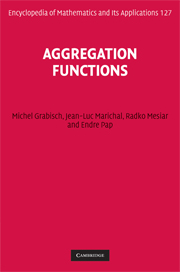Book contents
- Frontmatter
- Contents
- List of figures
- List of tables
- Preface
- 1 Introduction
- 2 Properties for aggregation
- 3 Conjunctive and disjunctive aggregation functions
- 4 Means and averages
- 5 Aggregation functions based on nonadditive integrals
- 6 Construction methods
- 7 Aggregation on specific scale types
- 8 Aggregation on ordinal scales
- 9 Aggregation on bipolar scales
- 10 Behavioral analysis of aggregation functions
- 11 Identification of aggregation functions
- Appendix A Aggregation of infinitely many arguments
- Appendix B Examples and applications
- List of symbols
- References
- Index
9 - Aggregation on bipolar scales
Published online by Cambridge University Press: 05 March 2013
- Frontmatter
- Contents
- List of figures
- List of tables
- Preface
- 1 Introduction
- 2 Properties for aggregation
- 3 Conjunctive and disjunctive aggregation functions
- 4 Means and averages
- 5 Aggregation functions based on nonadditive integrals
- 6 Construction methods
- 7 Aggregation on specific scale types
- 8 Aggregation on ordinal scales
- 9 Aggregation on bipolar scales
- 10 Behavioral analysis of aggregation functions
- 11 Identification of aggregation functions
- Appendix A Aggregation of infinitely many arguments
- Appendix B Examples and applications
- List of symbols
- References
- Index
Summary
Introduction
So far, we have mainly considered aggregation functions whose variables lie in [0, 1] or some similar structure, i.e., a closed interval of some linearly ordered set. The lower and upper bounds of this interval represent the lowest and highest scores (or utility values, outcomes, etc.) along each dimension.
We may desire to consider a third particular point of the interval, say e, which will play a particular role, for example a neutral value (in some sense) or an annihilator value. We have already encountered this situation when dealing with uninorms (cf. Section 3.6): e ∈]0, 1 [is a neutral element in the sense that ⋃(e, x) = x for any x ∈ [0, 1]. For convenience, up to a rescaling, we may always consider that we work on [−1, 1], and 0 corresponds to our particular point, denoted e before. In the more general case of bounded linearly ordered sets, we apply a symmetrization procedure; see Section 9.3.
The motivation for such a study is not only mathematical. There is psychological evidence that in many cases, scores or utilities manipulated by humans lie on a bipolar scale, that is to say, a scale with a neutral value making the frontier between good or satisfactory scores, and bad or unsatisfactory scores. With our convention, good scores are positive ones, while negative scores reflect bad scores. Most of the time, our behavior with positive scores is not the same as with negative ones: for example, a conjunctive attitude may be turned into a disjunctive attitude when changing the sign of the scores.
Information
- Type
- Chapter
- Information
- Aggregation Functions , pp. 317 - 347Publisher: Cambridge University PressPrint publication year: 2009
